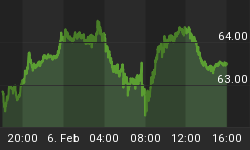By James Hyerczyk
Higher than expected inflation and soft Fed comments, helped to drive the AUD USD higher. On Wednesday, the Australian Dollar advanced from a four-week low after a government report showed inflation almost doubled during the last quarter. This triggered a short-covering rally on renewed talk that the Reserve Bank of Australia would raise interest rates at its May meeting.
After holding steady throughout the day, the Aussie surged to a new high for the day after soft comments from the U.S. Federal Reserve indicated that interest rates would remain at historically low levels. With the Fed holding rates steady and the RBA likely to raise rates, the interest rate differential remained in favor of the Aussies. This led to a strong rally after the release of the Fed's FOMC statement.
The NZD USD traded mostly higher on Wednesday and closed better after the Fed's FOMC statement indicated that interest rates would remain low for "an extended period". With the Reserve Bank of New Zealand ready to issue its policy statement tonight, traders bought the Kiwi in anticipation of a hawkish commentary. Although the RBNZ is on record stating that interest rate are to remain low until at least the middle of the year, some traders are speculating that recent economic developments may be putting pressure on the central bank to hike interest rates sooner than expected.
The Euro tumbled to a new low for the year after Spain's debt was downgraded to AA. Traders initially sold off the Euro in a knee-jerk reaction, but selling pressure quickly dried up. Although the Euro reached a new low for the year, the selling pressure was not as intense as Tuesday's reaction. This was because investors had already discounted the possibility of the downgrade.
After bottoming about mid-morning, trading stabilized in the Euro until the early afternoon when the Federal Reserve released its policy statement. The FOMC kept interest rates at historically low levels and left its somewhat dovish statement intact. In other words, rates are to remain low for "an extended period". Although the Fed sees improvements in the economy it still feels that unemployment is a problem as well as tight consumer credit. Furthermore it thinks the housing market can be improved. Once again the Fed stated that inflation is expected to be "subdued". The Euro's rally accelerated to the upside after the Fed's statement was digested.
Wednesday's trading action seemed to be indicating that traders had faith that a resolution between Greece and the EU/IMF would be reached soon. This was probably the reason for the less aggressive trading on the short-side. In fact, the way the market traded, it looks as if bottom-pickers were stepping in. At the close, the Euro formed a closing price reversal bottom which could lead to a 2 to 3 day rally and a retracement to 1.3403.
Bearish traders should remain cautious at current levels so they don't get caught in a massive short-covering rally. There are still plenty of shorts still in the game, but it isn't going to take much to encourage the weaker shorts to cover fresh losing positions.
It looks as if traders are backing away from aggressively shorting the Euro as long as the EU/IMF is still working out the details of the bailout. If anything should happen during the negotiations and talks were called off, then look for the Euro to plunge. As long as the bailout dialogue is open, it appears as if traders have priced in the worse case scenario for the time being.
Talk of a "fragile" economy and renewed concerns about the U.K. election led to a hard sell-off in the GBP USD on Wednesday. Investors are also concerned that the problems in the Euro Zone may soon spread to the U.K. This is the main reason why traders are worried about the May 6th election.
With the election too close to call at this point in time, traders are worried that the outcome may result in a hung parliament. If this occurs than it is possible that political uncertainties may result in a failure to achieve a balanced budget. This would cause more debt to be issued, leading to the possibility that the U.K. credit rating will be lowered. With an explosive situation brewing in Europe, it would not take much for debt issue problems to escalate in the U.K.
The strong recovery in U.S. equity markets helped rally the USD JPY. In addition, traders are worried that Japanese debt may be next in line to be downgraded. Like certain Euro Zone nations and the U.K., Japan has a huge debt problem on its hands which could lead to a downgrade. Not only are traders selling the Yen as a carry trade, but today it looked as if traders were pressuring the Yen in anticipation of a debt rating downgrade.
Renewed interest in higher yielding assets and lower interest rates in the U.S. helped drive the USD CAD lower. With the Bank of Canada already on record stating that interest rates are going to move higher in June and the Fed saying that U.S. rates will remain low for "an extended period", the interest rate advantage has shifted to Canada. This is the primary reason for the strength in the Canadian Dollar on Wednesday. Longer-term traders should continue to press the USD CAD lower because of the strengthening Canadian economy and the likelihood of a series of interest rate hikes over the next several months.















